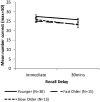Accelerated forgetting in healthy older samples: Implications for methodology, future ageing studies, and early identification of risk of dementia
- PMID: 35786222
- PMCID: PMC10196925
- DOI: 10.1177/17470218221113412
Accelerated forgetting in healthy older samples: Implications for methodology, future ageing studies, and early identification of risk of dementia
Abstract
Accelerated long-term forgetting (ALF) has been reported in healthy older individuals, and is a possible early marker for risk of developing Alzheimer's disease (AD). The Verbal Associative Learning and Memory Test (VALMT) addresses methodological weaknesses in existing clinical tests and has detected ALF in epilepsy within an hour. We used VALMT to investigate learning and forgetting in healthy Older participants. Older (60-69 years) and Younger (19-31 years) participants were compared. Using VALMT, unrelated word pairs were learnt to criterion, then cued-recall tested at delays of 5, 30, and 55 min. Unique pairs were tested at each delay. Subjective memory complaints data was gathered, and the Wechsler Memory Scale Logical Memory test (WMS-LM; a standard clinical measure) was administered. VALMT identified a significant difference in delayed recall between Younger and Older groups by 55 min (d = 1.32). While "fast-learning" Older participants scored similarly to Younger participants, "slow-learning" Older participants were impaired at all delays. Forgetting rates suggested degradation of memory starts during early synaptic consolidation rather than later system-level consolidation. Increased subjective memory complaints were associated with reduced VALMT scores. By contrast, WMS-LM failed to identify significant differences between any groups, and did not correlate with memory complaints. We conclude that VALMT may be better able than WMS-LM to identify subtle impairments in healthy older adults within a single clinical visit, and VALMT results better reflect subjective experience. Older slow-learners forget faster and report more subjective memory complaints, which may indicate a group at risk of developing AD.
Keywords: Accelerated long-term forgetting; accelerated forgetting; ageing; consolidation; forgetting rates.
Conflict of interest statement
The author(s) declared no potential conflicts of interest with respect to the research, authorship, and/or publication of this article.
Figures









References
MeSH terms
LinkOut - more resources
Full Text Sources
Medical

